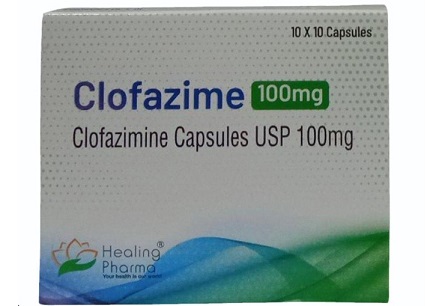Philadelphia Study Find That Clofazimine Could Be Used As An Antiviral Against SARS-CoV-2
Nikhil Prasad Fact checked by:Thailand Medical News Team Apr 23, 2024 1 year, 9 months, 2 weeks, 3 days, 5 hours, 6 minutes ago
COVID-19 News: The COVID-19 pandemic ushered in an era of unparalleled scientific exploration, as researchers worldwide delved into repurposing existing drugs to combat the novel coronavirus, SARS-CoV-2. Among the myriad compounds scrutinized, Clofazimine and Arbidol emerged as noteworthy contenders due to their in vitro efficacy as SARS-CoV-2 fusion inhibitors. These drugs, initially developed for other medical purposes, captured attention for their potential to be repurposed as antivirals in the fight against COVID-19. This
COVID-19 News report covers a study by researchers from Thomas Jefferson University, Philadelphia-USA that finds that clofazimine could be used as an antiviral against SARS-CoV-2.
 Clofazimine Could Be Used As An Antiviral Against SARS-CoV-2
Clofazimine and Arbidol: Promising Fusion Inhibitors
Clofazimine Could Be Used As An Antiviral Against SARS-CoV-2
Clofazimine and Arbidol: Promising Fusion Inhibitors
Clofazimine, a drug with a history of use in treating leprosy and drug-resistant tuberculosis, garnered attention for its inhibitory effects on SARS-CoV-2 fusion. In parallel, Arbidol, another repurposed drug, showcased similar promise as a fusion inhibitor against the virus. These findings were not only significant for potential COVID-19 treatments but also underscored the importance of drug repurposing in emergencies like pandemics.
Investigating Binding Affinities: Surface Plasmon Resonance (SPR) Assays
To delve deeper into the mechanisms of Clofazimine and Arbidol's antiviral actions, researchers employed sophisticated assays such as the Surface Plasmon Resonance (SPR) binding assay. This technique allowed for precise measurement of small-molecule bindings to specific segments of the SARS-CoV-2 Spike protein, particularly the S2 segment implicated in viral fusion.
Clofazimine's Strong Affinity for the S2 Segment
The results of SPR assays revealed Clofazimine's robust binding to the S2 segment of the Spike protein. This binding affinity surpassed that of Arbidol and other compounds under investigation, showcasing Clofazimine's potential as a potent fusion inhibitor against SARS-CoV-2.
Molecular Docking Studies: Unraveling Binding Sites
In tandem with experimental assays, molecular docking studies provided insights into the precise binding sites of Clofazimine and Arbidol on the S2 segment. These computational models not only corroborated experimental findings but also laid the groundwork for understanding the structural basis of these drugs' antiviral activity.
Clinical Considerations and Drug Derivatives
Despite its efficacy as a fusion inhibitor, Clofazimine's clinical use is tempered by adverse effects and limitations in systemic administration. However, ongoing efforts to develop derivatives with improved pharmacological properties, such as reduced lipophilicity and enhanced solubility, offer promise in overcoming these hurdles.
Implications for Broad-Spectrum Antiviral Activity
One of the intriguing aspects of Clofazimine's binding to the S2 segment is its potential for broad-spectrum antiviral activity. Structural and sequence analyses suggest that Clofazimine's mechanism of action could extend to other coronaviruses, including SARS-CoV, MERS-CoV, hCoV-229E, and hCoV-OC43. This broad activity hints at the drug's versatility in combating a range of viral infections.
Clofazimine's Role in Stabilizing the Prefusion Conformation
By binding to the prefusion conformation of the Spike protein, Clofazimine acts as a stabilizer, preventing the conformational changes necessary for viral membrane fusion. This mode of action underscores its potential as a therapeutic agent not only against SARS-CoV-2 but also in addressing future viral threats.
Future Directions and Collaborative Efforts
As research into Clofazimine's antiviral properties progresses, collaborative efforts between scientists, clinicians, and pharmaceutical companies are vital. Mutational studies, combination therapies, and clinical trials will be crucial in elucidating the full potential of Clofazimine as a frontline antiviral agent.
Conclusion: Clofazimine's Journey from Leprosy to COVID-19
Clofazimine's journey from a drug used in leprosy treatment to a potential antiviral against SARS-CoV-2 epitomizes the resilience and adaptability of scientific exploration. While challenges remain, the strides made in understanding Clofazimine's mechanisms of action and its structural interactions with viral proteins herald a new era in antiviral therapeutics. As the world continues its battle against COVID-19 and prepares for future viral threats, Clofazimine stands as a beacon of hope and innovation in the fight against infectious diseases.
The study findings were published in the peer reviewed journal: Viruses.
https://www.mdpi.com/1999-4915/16/4/640
For the latest
COVID-19 News, keep on logging to Thailand Medical News.
